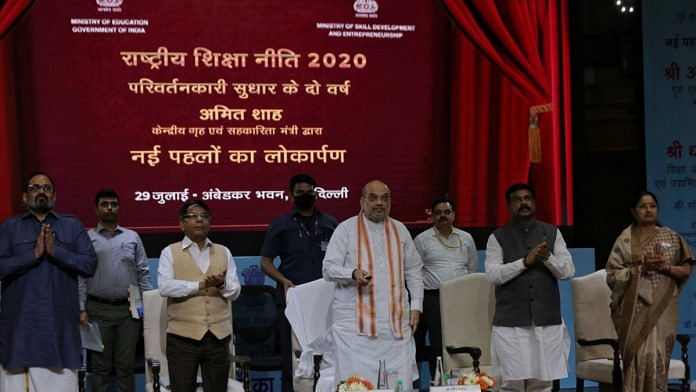New Delhi: School students will be encouraged to work on their own start-ups as part of the Narendra Modi government’s newly-launched School Innovation Scheme aimed at promoting the spirit of innovation among young Indians.
The scheme — launched Friday — is among a host of new initiatives announced by the Ministry of Education (MoE) to mark two years of the new National Education Policy (NEP) 2020. The initiatives seek to usher in the next phase of NEP 2020.
Fostering entrepreneurial spirit and encouraging innovation at schools.
Launch of School Innovation Policy. #2yearsofNEP pic.twitter.com/AcGjnSeUtq
— Dharmendra Pradhan (@dpradhanbjp) July 29, 2022
These include setting up 750 virtual labs for science and mathematics students which are set to benefit nearly 10 lakh teachers and 10 crore students, the Education ministry said.
In addition, school students will be encouraged to take up “Bhartiya Games”, which are suited to Indian weather conditions. These include 75 sports traditionally played in India such as archery, kabaddi, and wrestling, among others.
The push for “Bharatiya Games” is part of the government’s Indian Knowledge Systems (IKS) initiative which promotes learning based on an India-centric approach by drawing from Vedas and Indian scriptures.
Speaking at the launch event at Ambedkar International Center in New Delhi, Union Home minister Amit Shah praised the ministry’s efforts to implement the NEP.
While emphasising the importance of Indianising education, he also lauded the ministry’s push to impart education in the mother tongue — the NEP has suggested promoting education in the mother tongue right from pre-school to University level.
“Right now, we are only able to utilise five per cent of our (youth’s) potential because we are not teaching in our mother tongue. Once we start imparting education in our mother tongue, we will be able to unlock the full potential of our youth,” he said.
Launched in July 2020, the NEP suggested staggering changes to India’s education system, including introduction of a new 5+3+3+4 (foundational stage + preparatory stage + middle stage + secondary stage) format instead of the existing 10+2 format (kindergarten + Classes 1-12).
At the higher education level, the policy suggested multiple entry-exit systems in colleges and a four-year undergraduate programme instead of the existing three-year programme. Most of these suggestions have now been implemented.
Apart from Union Education minister Dharmendra Pradhan, Vice Chancellors of various universities and Directors of IITs and IIMs were also present at the event Friday, along with officials of multiple ministries.
(Edited by Amrtansh Arora)
Also Read: School dropout rate among girls gone down in 4 yrs says Modi govt, claims credit for schemes



